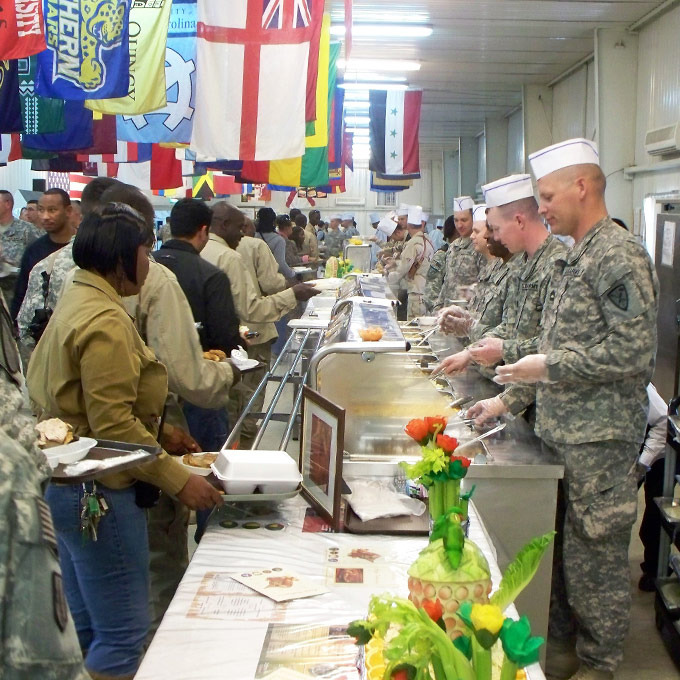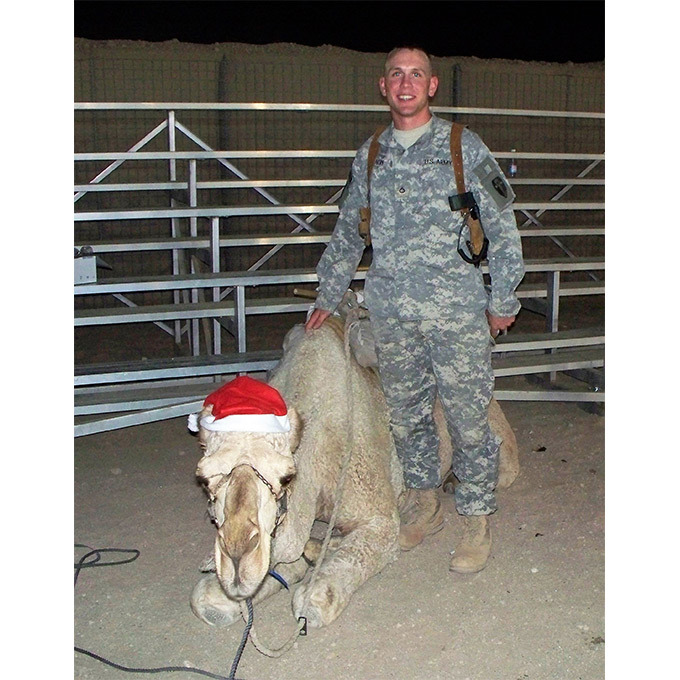How Troops Get Into The Christmas Spirit
How our troops get a taste of Christmas overseas
All December long, we're bringing you the recipes, tips and tricks you need to Feast your way through the holidays, no matter how you celebrate the season.
In 1914, Pope Benedict XV proposed a truce for soldiers fighting in the trenches of World War I. No country formally agreed to the idea, but on Christmas, troops—some believe as many as 100,000 along the western front—held their fire. There were even rumors about the exchange of small gifts like cigarettes and sweets between enemies, impromptu soccer games, and battlefield carols. One account from a member of the Fifth London Rifle Brigade recalled the day:
Although a Christmas Day truce has never been reported since, there are still plenty of men and women serving in and with the armed forces abroad during the holidays. From care packages from home to gingerbread displays to special dinners, here are their stories about how they keep the Christmas spirit alive.
Rob Schiffer, Resident Engineer for the U.S. Army Corps of Engineers
Despite being in Mosul in 2010, when Schiffer says "things were starting to ramp down in Iraq," the base's dining facility erected a 10-by-five-foot gingerbread village right before the holiday. The village was mostly built out of things the kitchen staff had on hand. "The light poles were drinking straws; I think the tops were chewed-up yellow gum" to look like lights, Schiffer says. The kitchen, staffed with workers from the Philippines, India and Pakistan, had "probably never seen a gingerbread house before. . . . I don't know how [the managers] explained that," he adds.
RELATED Spice Up Your Cookie Swap with These Gingerbread Stunners "
Stephen J. Pascual, Seaman, U.S. Navy
While stationed in Japan last Christmas as a naval cook, the kitchen was asked to cook Christmas dinner for more than 1,000 people. Each cook was given a particular ingredient—for Pascual, that was crab legs, something his family prepares back home. "The day before Christmas, I called my dad to ask how he seasons and cooks it. He gave me the ingredients: salt, pepper, Old Bay seasoning, lemon halves, orange halves for a little bit of citrus, garlic, celery and onions." The result was having at least one dish on the table that was a taste of home—and earned him some bragging rights. "It was the best thing on the menu, according to my supervisors, and along with other sailors and civilians," he says.
Photo: Courtesy of Kevin Norton
Marco*, Military Intelligence Officer Supporting the 3rd Infantry Division of U.S. Army
On a day close to Christmas in Iraq in 2005, Marco opened a large package from his college roommate's family. "It was jam-packed full of jarred and canned goods, olives and sun-dried tomatoes, and pasta and all this stuff," he recalls. Using a calling card, he reached out to thank his friend who sent the package. His buddy confessed, "My dad thinks you can go into the dining facility and just tell them what you want to eat." Even though that's not quite how it works, the food did end up coming in handy. Marco was able to give it to contractors running the laundry on base. "I traded it for capital . . . to get in their good graces, so I wasn't missing socks."
*For security reasons, Marco has asked that his last name remain anonymous.
Margaret W. Burcham, Brigadier General, U.S. Army, Retired; and Jay Burcham, Lieutenant Colonel, U.S. Army, Retired
Having served for 34 years and 21 years respectively, the Burchams spent numerous Christmases stationed abroad. During the 10 years they lived in Germany, the family often visited the country's Christmas markets during their time off. "We've gotten a lot of Christmas decorations from there that we've brought back," Margaret says.
But there were also Christmases spent deployed on bases in Iraq (Margaret) and Afghanistan (Jay). "You're in the middle of nowhere," Margaret recalls. It was here that she celebrated Christmas in 2008, with a buffet of classics like turkey and sweet potatoes, and even a large ice sculpture in the shape of a dragon that somehow managed to not melt over an eight-hour day. "It's something that's a big deal in the Army," she says of the ice sculptures. "I remember thinking it was really funny. . . . Everything is not the way it would normally be."
In Afghanistan in 2010, Jay remembers joining other supervisors in the dining facility to serve the junior soldiers on base, a tradition in the armed forces on Thanksgiving and Christmas. "We were inside the Green Zone, which isn't totally safe," he remembers. "Everyone was told to write home and have some sort of festive, Christmassy clothes sent over. The girls got their finest and the guys got sweaters and we had an evening dinner and it was all lit by candles."
Photo: Courtesy of Kevin Norton
Kevin Norton, Health Care Specialist, United States Army National Guard
"It's tough being away from home for a holiday," says Norton, who served as a medic in Iraq over Christmas 2008. "But we made the best of it." He had a bit of help from his mom, who went the extra mile to bake brownies. She "wrapped them in Saran wrap, froze them, wrapped them in wax paper, and then Ziplocked and mailed them immediately," he remembers. It generally took about seven to 10 days for mail to arrive on base—typically too long for cookies to stay fresh—but the brownies arrived intact. "They were delicious. I don't know if they were delicious, because we didn't have fudge brownies there or because they were just delicious. But in my mind, they were really good." Did he share them with his friends? "I had no option."
If you'd like to send a card or gift to soldiers stationed abroad during the holidays, please visit the American Red Cross or USO Wishbook.


